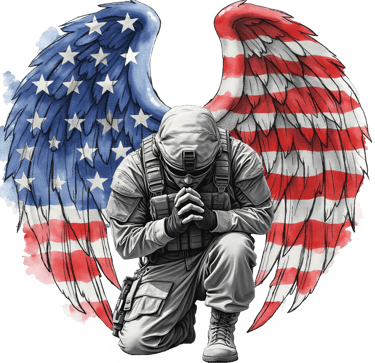Did you know…
An average of 17.6 veterans die by suicide every single day.
The suicide rate among veterans is over 1.5 times higher than that of non-veteran U.S. adults—even after adjusting for age and sex.
In 2022 alone, we lost 6,407 veterans to suicide.
And for veterans under age 45, suicide is the second leading cause of death.
I share this not as a statistician, but as a veteran who battles severe PTSD and major depression myself. I know what it feels like to fight battles no one sees. I know how heavy the days can be. And I also know that awareness saves lives, compassion saves lives, and Jesus Christ saves lives.
If you want to help a veteran who may be struggling, here are some real, practical ways you can make a life-changing difference:
🔹 Learn the Warning Signs
A veteran may be in crisis if they are:
Withdrawn, depressed, or unusually sad
Feeling hopeless or trapped
Showing anxiety or agitation
Misusing alcohol or drugs
Talking about death, self-harm, or feeling like a burden
These signs don’t always mean someone wants to harm themselves, but they tell us someone needs love, support, and connection.
🔹 Don’t Be Afraid to Ask
Asking directly:
“Are you thinking about killing yourself?”
does not increase risk.
It does not put the idea in someone’s head.
Instead, it opens a door—
a door for honesty,
a door for connection,
a door for hope.
Sometimes that one question becomes the lifeline a veteran has been quietly waiting for.
🔹 Use the S.A.V.E. Method
A simple and powerful VA-recommended approach:
S — Signs of suicidal thinking should be recognized.
A — Ask the most important question directly.
V — Validate the veteran’s feelings—listen with compassion, not judgment.
E — Encourage treatment and help them get support quickly.
These steps may seem small, but to a hurting soul they can become a bridge between despair and hope.
🔹 Help Veterans Connect to Care
Many of the veterans we lose every year were not connected to VA services.
Encourage them to explore help.
They can apply for VA health care using VA Form 1010EZ online
or call 1-877-222-VETS (8387) to speak with someone directly.
Connection saves lives.
Isolation destroys them.
🔹 Promote Secure Storage
During a mental health crisis, reducing access to firearms and medications can save a life.
Encourage veterans and families to use:
Gun locks
Lock boxes
Secure medication storage
This isn’t about taking anything away.
It’s about protecting life during a moment of overwhelming pain.
🔹 Show Genuine Compassion
Sometimes the greatest ministry isn’t a sermon—it’s:
Sitting beside someone
Listening without judgment
Offering kindness
Being a safe place
Saying, “I’m here. You’re not alone.”
Help is real.
Hope is real.
Support is available.
And God’s love is deeper than the darkest night.
❤️ You Matter. Your Life Matters.
To every veteran reading this:
You are not a burden.
You are not forgotten.
You are not alone.
Your story is not over.
Your purpose is not finished.
God is not done with you yet.
If you ever need someone to talk to, or if you feel overwhelmed—please reach out.
Talk to a friend, a family member, a pastor, or someone you trust.
And always remember this:
You are valued.
You are needed.
You are loved.
A Word to Every Veteran Reading This
If you’re a veteran and you feel tired, numb, angry, or overwhelmed…
Please hear this:
You are not a burden.
You are not forgotten.
You are not alone.
Your life matters.
Your story matters.
God is not done with you yet.
If you ever need someone to talk to, reach out—to a friend, a family member, a pastor, a battle buddy, or a crisis line.
And as a fellow veteran, I want you to know:
I see you. I care. Your life is worth fighting for.
“The Lord is close to the brokenhearted and saves those who are crushed in spirit.”
— Psalm 34:18
Hope
Victory is ours through Jesus Christ.
Connect
© 2025. All rights reserved.
